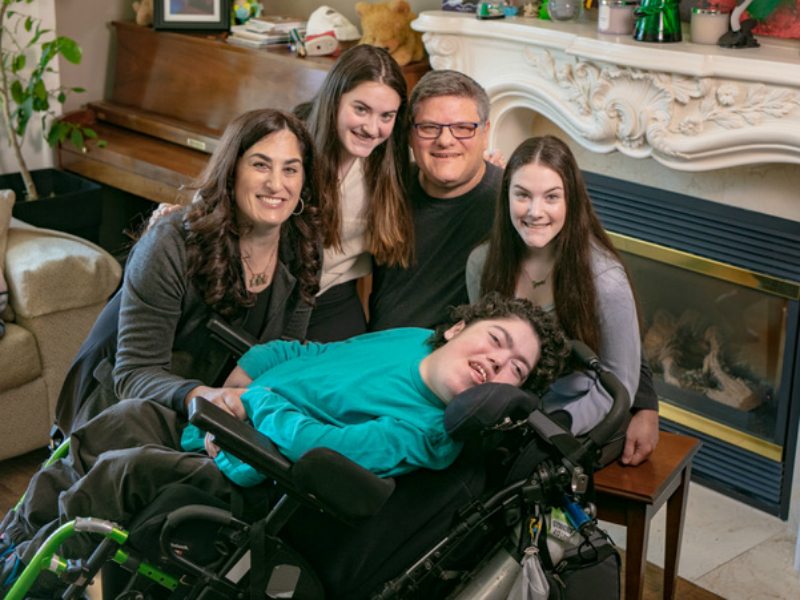As COVID-19 tightens its grasp on our global society, families are adjusting to a new way of living. And many parents have taken comfort knowing that children are less susceptible to the new coronavirus. But for parents of medically compromised children, the threat this virus presents is terrifying.
Dana Geall is a mother to 12-year-old triplets: Brody, Taylor and Cole Florence. All three have cerebral palsy and require 24/7 care. Before the pandemic, Geall and her family relied on many professionals, from teachers, EAs, nurses, therapists and PSWs. Now the family is living in a self-contained bubble at home relying only a couple of meticulously screened nurses and personal support workers who are following the same protocols of self quarantine in their own homes.

“I must protect my children. I’m not a person who likes to live in fear – this (COVID-19) is the type of thing that takes children like mine,” Geall said. “Back in 2017, Taylor and Cole got the flu and they recovered. But Brody quickly went from having the flu to pneumonia to going into septic shock to the doctor having a sit-down conversation in the (intensive care unit) telling us he had a 50/50 chance of living or dying.”
The siblings, including 20-month-old Jagger, are all very close.
“They have questions that are not easy to answer,” Geall said. “The kids started watching Harry Potter and we’re reading Hana’s Suitcase, a beautiful book about the Holocaust. Often when people see us, they feel bad for us or pity us but they really shouldn’t because I have the most loving, happy and wonderful kids. I am the luckiest person.”
Jacob Trossman also needs 24-hour care. He has Pelizaeus-Merzbacher disease (PMD). Jacob can’t move and can’t talk. He needs to be repositioned frequently. If he coughs, someone needs to ensure he’s not choking. Jacob is in Grade 11 at high school and intellectually understands everything. He communicates by blinking his eyes for ‘yes.’
“Jacob requires three nursing shifts a day,” his mother, Marcy White said. “Jacob is so vulnerable. He ended up in the hospital for almost a year when he got a cold.”
The days are long and the family is getting out for walks, but careful to keep a safe distance from others.
“Jacob is watching shows on his iPad, working his way through Suits. Our world, in terms of what Jacob can do today, hasn’t changed that much but the fear that we always live with has exploded exponentially,” White said. “To think, before all of this, we were working on getting Jacob his passport – planning to take Jacob on a wish trip in May for his 18th birthday.”
Organizations across the country are devoted to social distancing with love.
Chai Lifeline Canada, an organization dedicated to helping children with serious illnesses and their family, is doing its part.
As Mordechai Rothman, the executive director, said, “We support kids who, themselves, had to be in isolation due to illness and cancer treatment. And for them it’s like everyone now in the world has to deal with what they’re dealing with for the last two or three years.
“Zoom is our new best friend. We have created online resources – it could be visiting museums, watching a magic show or participate in a Zumba class. We’re still able to provide meals in the community and our big brothers and big sisters are meeting through Zoom.”
Chai Lifeline offers after school programming that is normally by invitation.
“We will be doing that for the community at large. Activities will include crafts, baking, online seminars and workshops from our experts talking about anxiety and how to clean for Passover with a house full of kids,” Rothman said. “We are no longer bringing in volunteers, but that being said, if a family can’t afford a ride to a medical appointment, we do offer them a ride via Uber if they are willing to take it. We will cover the costs and arrange for that.”
For many children and adults with disabilities, the change in routine and schedule is difficult. That’s why DANI, an organization for adults with physical or cognitive challenges, has offered its services online.
“Flexibility is often an issue and this isolating situation has demanded daily resilience and adjustability,” Susie Sokol, the co-founder and director of DANI, said. “Our staff have set up classes – you can Zoom in for davening, learn how to keep healthy or participate in an art and book study.”
Ann Szabo, is the resource manager at Reena, a 24/7 organization for young adults with developmental disabilities.
“We are trying to keep our doors open while practicing social distancing, offering alternative programs for some families who may not be able to keep loved ones at home without going into crises,” she said. “Reena has assembled activity totes with educational resources to be delivered to some six hundred people in the community.”







